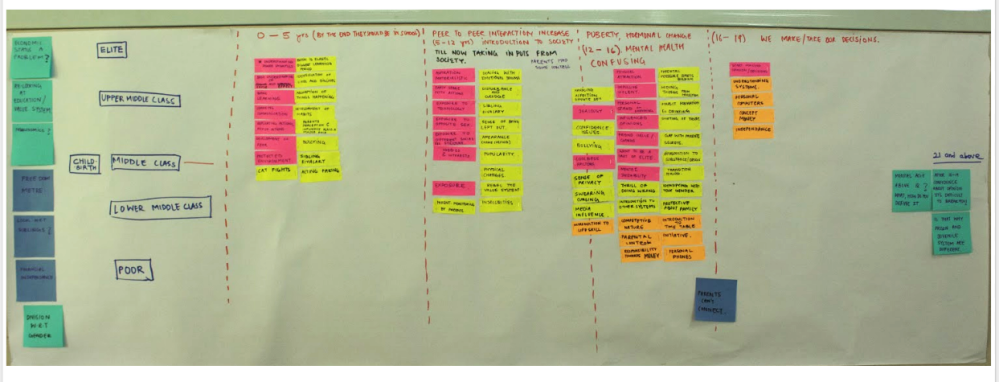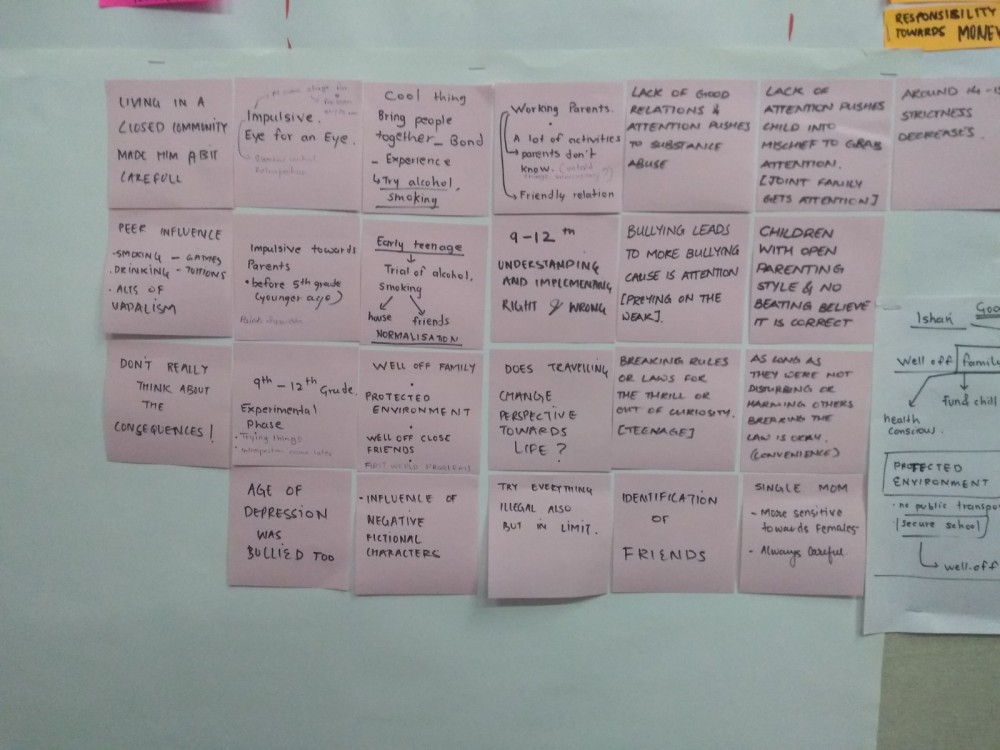From our study, we realized that a lot of parameters lead to a child committing a crime, in order to understand the influence of these parameters ,

we went ahead to plot a timeline of a child as he/she progresses and at every stage how a child changes according to the various influences he/she has. What exactly is the difference in a child’s decision when he/she belongs to a certain stratum of the society, what are the possible points at which due to a bad influence a child takes on the path of crime?. How parents belonging to different economic status deal and groom a child.
This whole matrix also made us look at parent and child relationship as a potential opportunity for early prevention of the child committing any crime. The number of hours parents spend with their children is inversely proportional to the child committing a crime.
The whole idea was to find various opportunities in this matrix to isolate the possible early interventions that could be done to prevent crime happening by the children belonging to different age groups and economic status.
The next step was to conduct interviews with kids from different age groups and socioeconomic statuses.
Directly asking questions about their parenting was not giving us the valuable insights hence we had to change the way we conduct our research. We selected the idea of sharing stories of childhood. We developed certain triggers and the rest the kids took it forward. From our interviews, we could figure out a few things:
Types of punishments:
- Reward-based
- Scolding
- Beating
- Silent treatment
- Stripping the privileges
Also how the kids from a different age, social-economic status had a different definition of the crime. How they have knowingly or unknowingly broken a law.

There were certain key takeaways from the following interviews:
- Living in a closed community helps a child in growing up with a better understanding of what to do and what not to do
- Peer influence – one of the major triggers for any child to fall into the vicious circle of substance, vandalism etc.
- This is the age when a lot of changes occur in the body leading to a lot of body shaming which intern leads to depression.
- A pattern was observed bullied children in childhood often turn out to be bullies in their youth.
- Influence of the content children watch. The definition of cool often leads to the child looking up to the antagonists and being like that. Often that becomes the self-identity of the child.
- Kids with single parents have a very different approach towards life, they often become mature faster. Especially seen in the case of our subject- the child was much more sensitive towards emotions, feelings, and was reluctant to get into substance abuse even though his peer group was doing it. It seems being raised by a single mother imparted resilience in the child.
- The 9-12 grade is the age of thrill, out of curiosity or just thrill children often try out a lot of things and also end up going against law knowingly.
- A lot of the kids have an attitude of an eye for an eye.
- 5th grade or below kids are often found to be aggressive towards parents if the demand is not fulfilled they show tantrums if not taken seriously these characteristics in the coming years might lead to becoming a violent kid.
- Children of working parents are often found doing a lot of activities which are unknown to parents and also bring them to the risk zone. The amount of time a parent spent with the child is very essential to how the child will develop his philosophy of life.
- Parents from different economic status often are strict about different parameters in the child’s life. it is observed that apart from education, the parents in the high economic status are more health conscious and open to exploration, whereas we down health goes out of the picture.
At the end of each interview, we started asking how these young children will raise their children and suggestions not only gave insights in what was missing from their childhood but also what is their take on ideal parenting
- Bad actions should be punished good actions should be rewarded
- Understanding and changing according to the generation gap
- Hitting is not the best idea, the child will be rebellious, an alternative approach should be taken for an explanation.
- As a parent, we should be free to talk to on any subject be it relationship alcohol or sex etc
- No restrictions no temptations, they can try everything in limits then let them decide their limits
- Give space but also give attention, a child might not be able to express so take time to understand
- Moral values should be given, the more they are the better they are.

From our ongoing research, we can clearly infer that as big of a role Parenting plays in the development of the child, the peer group is equally important. Friends play a very important role in imparting the identity the child bears.